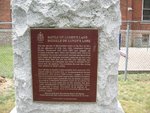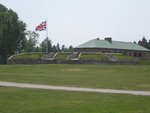"USS Constitution was largest but not the only US Navy ship at sea in 1815. The sloops of war USS Peacock and Hornet, along with US Schooner Tom Bowline also had successful cruises .
USS Hornet captured HMS Penguin in March, 1815 and then, in what must be the most monumental ship identification error, attacked HMS Cornwallis, a 74, thinking she was a large merchantman! The Hornet got away by jettisoning boats, guns, stores etc.
USS Peacock captured the East India Company cruiser Nautilus in the final naval action of the War of 1812 near Selat Sunda. The British brig had gotten word that the war was over but the Americans hadn't. (Hunting was good in those waters, Peacock only took three prizes but they were big ones with valuable cargos).
USS Constitution and USS United States were by no means the only large US Navy ships remaining. There were also USS Constellation 38 blockaded at Norfolk, and USS Macedonian. The former RN frigate was holed up with her erstwhile captor, the USS United States, in the Thames ... the one in Connecticut."
I recognise your knowledge on the U.S side is greater than mine, but don't get me wrong. I'm not saying the U.S Navy was all closed in; it wasn't all over. But after the summer of 1813 the USN had few chances for a success with impact. Those large ships that remained were not in open ocean, and until they were - they were useless.
"What was needed to overcome the blockading force were battleships. USS Independence 74 was launched at Charlestown in 1814. Although not yet ready to sail, she had received her 32pdr long guns and shared harbor defense duties with USS Constitution.
Like their smaller cousins, the US 74's were more powerful than their Rate. Records are not precise but they may have been based on a 1799 design by none other than Joshua Humphreys. They were over 190ft long (longer than a Second Rate) and carried 30 32-pdr long guns in their lower gun deck, 32 medium 32-pdr in the middle gun deck and 20+ 42-pdr carronades on the upper deck. (Had to be said that the Independence had some problems due to ill-advised modifications that Commodore Bainbridge insisted on making during her construction).
USS Washington 74, was also launched in 1814 ... at Portsmouth Navy Yard (that's in NEW Hampshire). Had the war dragged on into the winter of 1815, there could have been simultaneous break out attempts by two US battleships, possibly during bad weather. Once at sea, the two supported by USS Constitution from Boston, would likely have forced the RN blockading force off their stations. That would, in turn, spring loose others including the new USS Guerrière in Philadelphia, USS Java from Baltimore, USS United States and Macdeonian from up the Thames, as well as possibly USS Constellation from Norfolk."
With all that it's getting into the realms of 'what if' - and then we can start bringing into the equation a loss of Napoleon and the Royal Navy shifting focus to the troublesome U.S. I think we all recognise the USN only had success because the Royal Navy had bigger fish to fry in Europe.
I'm sorry but the Constitution would have probably never made it to the annals of history if the Royal Navy had deployed ships of the line against the US. And if the war had continued the Royal Navy may have come over in force; in 1810 England had 152 ships of the line, the U.S had a small enough navy to be able to name every brig and sloop.
"Oh, BTW, HMS President has been described in UK accounts as a "precise copy" of the captured US frigate. As was pointed out earlier, almost all other copies of the period were merely adaptations based on the lines of the captured ship. (That would include HMS Endymion, "copied" based on the French Pomone) . However, HMS President was an exception and ... sincerest form of flattery to the American Master; Joshua Humphreys."
I'd like to know more about this; the only information I have on the HMS President is that it was just the USS President fitted to British standard and broken up in 1818. The next HMS President was launched in 1829 as a 52-gun fifth rate.
USS Hornet captured HMS Penguin in March, 1815 and then, in what must be the most monumental ship identification error, attacked HMS Cornwallis, a 74, thinking she was a large merchantman! The Hornet got away by jettisoning boats, guns, stores etc.
USS Peacock captured the East India Company cruiser Nautilus in the final naval action of the War of 1812 near Selat Sunda. The British brig had gotten word that the war was over but the Americans hadn't. (Hunting was good in those waters, Peacock only took three prizes but they were big ones with valuable cargos).
USS Constitution and USS United States were by no means the only large US Navy ships remaining. There were also USS Constellation 38 blockaded at Norfolk, and USS Macedonian. The former RN frigate was holed up with her erstwhile captor, the USS United States, in the Thames ... the one in Connecticut."
I recognise your knowledge on the U.S side is greater than mine, but don't get me wrong. I'm not saying the U.S Navy was all closed in; it wasn't all over. But after the summer of 1813 the USN had few chances for a success with impact. Those large ships that remained were not in open ocean, and until they were - they were useless.
"What was needed to overcome the blockading force were battleships. USS Independence 74 was launched at Charlestown in 1814. Although not yet ready to sail, she had received her 32pdr long guns and shared harbor defense duties with USS Constitution.
Like their smaller cousins, the US 74's were more powerful than their Rate. Records are not precise but they may have been based on a 1799 design by none other than Joshua Humphreys. They were over 190ft long (longer than a Second Rate) and carried 30 32-pdr long guns in their lower gun deck, 32 medium 32-pdr in the middle gun deck and 20+ 42-pdr carronades on the upper deck. (Had to be said that the Independence had some problems due to ill-advised modifications that Commodore Bainbridge insisted on making during her construction).
USS Washington 74, was also launched in 1814 ... at Portsmouth Navy Yard (that's in NEW Hampshire). Had the war dragged on into the winter of 1815, there could have been simultaneous break out attempts by two US battleships, possibly during bad weather. Once at sea, the two supported by USS Constitution from Boston, would likely have forced the RN blockading force off their stations. That would, in turn, spring loose others including the new USS Guerrière in Philadelphia, USS Java from Baltimore, USS United States and Macdeonian from up the Thames, as well as possibly USS Constellation from Norfolk."
With all that it's getting into the realms of 'what if' - and then we can start bringing into the equation a loss of Napoleon and the Royal Navy shifting focus to the troublesome U.S. I think we all recognise the USN only had success because the Royal Navy had bigger fish to fry in Europe.
I'm sorry but the Constitution would have probably never made it to the annals of history if the Royal Navy had deployed ships of the line against the US. And if the war had continued the Royal Navy may have come over in force; in 1810 England had 152 ships of the line, the U.S had a small enough navy to be able to name every brig and sloop.
"Oh, BTW, HMS President has been described in UK accounts as a "precise copy" of the captured US frigate. As was pointed out earlier, almost all other copies of the period were merely adaptations based on the lines of the captured ship. (That would include HMS Endymion, "copied" based on the French Pomone) . However, HMS President was an exception and ... sincerest form of flattery to the American Master; Joshua Humphreys."
I'd like to know more about this; the only information I have on the HMS President is that it was just the USS President fitted to British standard and broken up in 1818. The next HMS President was launched in 1829 as a 52-gun fifth rate.


